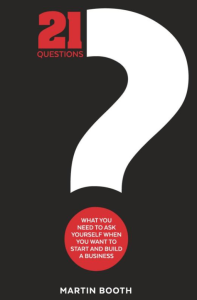By Martin Booth, below, author of 21 Questions
 When you start a business, your excitement about the new endeavour is likely to be tempered with trepidation. There seems to be so much to know about so many different things – many of which might lie way beyond the borders of your current expertise.
When you start a business, your excitement about the new endeavour is likely to be tempered with trepidation. There seems to be so much to know about so many different things – many of which might lie way beyond the borders of your current expertise.
Fortunately, there is a load of great advice out there. You can listen to inspirational speakers, you can read books full of useful tips, and you can soak up the expertise of people you meet at networking events and in the course of running your business. But how can you be sure you are getting the advice that is most relevant and useful to you and your new enterprise? And how can you be confident that there aren’t whole areas of activity you are not addressing?
I’m happy to admit that this is how I felt when I launched my copywriting consultancy, LeBoo Media, in 2017. I was 53, I’d worked for several decades in sports journalism and I’d spent years in B2C and B2B roles in the betting industry. But I’d never run my own business and I was acutely, painfully aware that I needed to learn a lot. Fast. It was like studying for 10 GCSEs from scratch all at once, with the exams only days away.
In the six years since, LeBoo Media has grown to become as successful as I could ever have hoped. In the process, I have learned more about running a business than I could ever have believed. But when I look back to those early days, I wish I could have put all that advice, all those insights and all that received knowledge into a structured framework, rather than cramming it all into one big mental hopper and hoping something useful would emerge at the moments when I most needed it.
That’s what I wished. So I wrote a book about it.
It’s called 21 Questions, and it starts with the suggestion that you take a big step back when you’re in the process of plotting the way forward. Instead of looking for all the answers, try identifying the questions first. They should give you a framework, a structure, against which you can build a coherent and compelling strategy.
The book is split into three sections, relating to the successive phases of planning, launching and building your new business.
Planning Your Business
The questions in this section are broad in nature – but some of the answers will be intensely personal. It’s essential that you subject yourself to scrutiny when you are thinking of launching your own company, and that you react to that scrutiny with complete honesty.
As well as the questions that examine your decision to go into business, there are others in which I draw on my experience to share what I hope will be useful information. Always with the proviso, though, that the only answers that matter for you are the ones inside your head, and at your fingertips.
In this first section, one of the questions I suggest you ask yourself is: Does the world need what I want to sell it?
Now, you might feel the answer to this is obvious. Of course it does! You may be venturing into a well established, mature market place where demand for expert services is consistently high.
That leads in turn to the need for you to corner enough of that market place to be sure that your business achieves the level of activity it requires to be viable – but that’s another question for elsewhere in the book.
At this stage, I’m suggesting you need to reassure yourself you are on a firm footing by being sure that there will be a demand for your products and services. This may require a mixture of research and soul searching, but time spent assessing the likely resonance and appeal of your new enterprise is definitely not time wasted.
Launching Your Business
This part of the book looks at the critical stage when the countdown to lift-off hits zero. This is when you’ve done your research, you are sure you are bringing a compelling service to market and you have put the structures in place to deliver it as efficiently as possible.
One question I suggest you should ask yourself – if you haven’t already, during the planning stage – is: How do I price my services?
This is the point in the book where I talk about Imposter Syndrome. I genuinely had no idea for the longest time that this was such a common condition. It’s only since I joined the ranks of business owners that I realised how many of us worry, deep down, that we’re not actually good enough to be doing what we do.
Pricing is an area that is definitely impacted by Imposter Syndrome. If you subconsciously don’t place a high enough value on your own capabilities, it makes it hard to set the costings that your business needs to survive and thrive.
Particularly in the early stages, when you simply want to get the wheels turning and are liable to compromise on price just to get some cash, any cash, flowing into your coffers.
Whatever type of business you are launching, whatever area of expertise you are operating in, you will be able to find out “the going rate” for a job – and to price your work accordingly.
I’m not pretending it’s easy. What element of setting up a successful business is? But be honest with yourself, believe in what you are doing, and you should come up with a pricing strategy that reflects the value of what you are delivering to the world.
Building Your Business
The third section of the book looks at subjects that are likely to be of more interest once your enterprise has left the ground and is flying steadily – well, OK, with several bumps and twists and turns – towards cruising altitude.
One question I suggest you can ask at this point is: How do I grow my skill set?
The self-examination that you undergo at this point should lead to the reassuring conclusion that you have an awful lot of skills already. It’s extraordinary how little credit we all give ourselves for this. One reason for this collective modesty is that there are things we do on a daily basis that would be beyond the reach of the vast majority of our peers. And yet, because we do them every day, we take them for granted when, in fact, these capabilities are our special sauce.
Having given ourselves a well-deserved pat on the back, it’s time to be honest and reflect on the areas where we’re not so hot – and could do with a little help. This could be an extension of your current skill set, or an expedition in a different direction to bring whole new territories within your comfort zone.
As with all the subjects covered in 21 Questions, the answers are out there, and they are probably closer than you think.
What matters is that you have the courage and honesty to look yourself in the eye and ask the questions that hold the key to unlock your successful future path forward.
Starting your own business is one of the bravest things you ever do. And it’s ironic that, even though you know there are millions of other people out there doing the same thing, you can experience moments of intense loneliness in the process.
One reason for that is that nobody is quite like you – just as no business is quite the same as yours. It’s that individuality that makes, I would suggest, honest self-examination such an important and healthy part of the process.
Your answers may be different to mine, and they may be different to the person down the road running the same type of business as you. What matters is that you come up with answers that are most valuable, useful and productive to you and your business.
In circumstances like that, asking the right questions is an answer in itself.
 21 Questions: What You Need To Ask Yourself When You Want To Start And Build A Business
21 Questions: What You Need To Ask Yourself When You Want To Start And Build A Business


